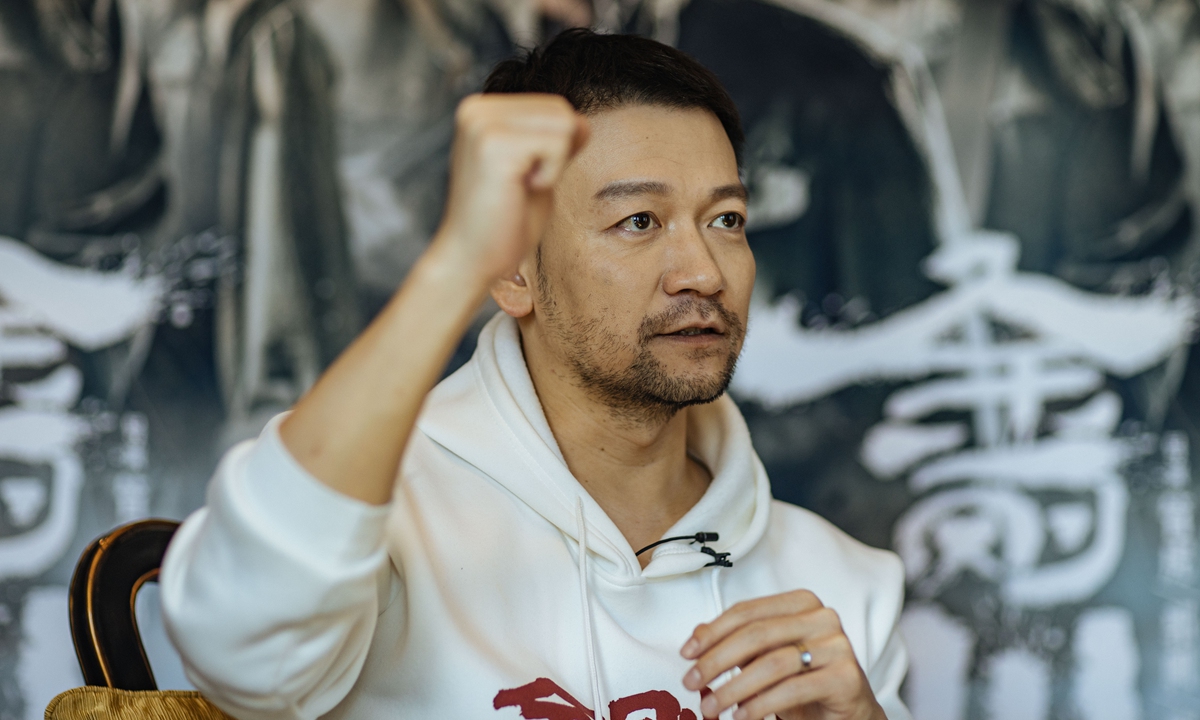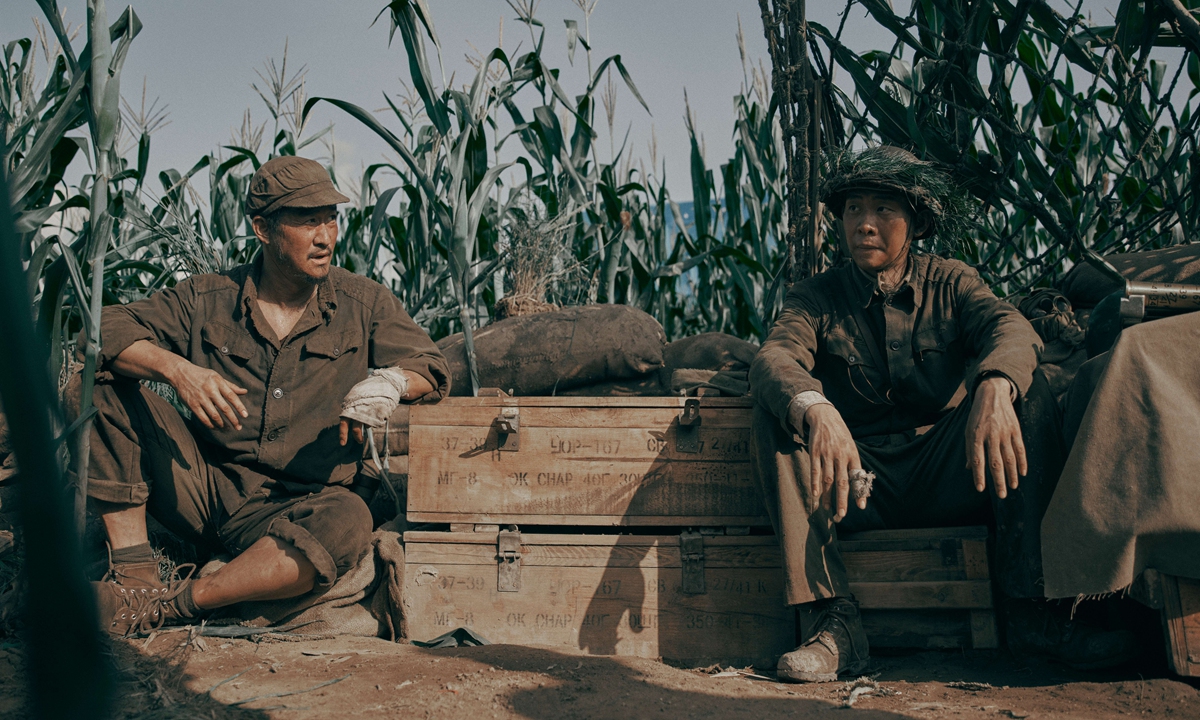Chinese director Guo Fan talks about new Korean War movie ‘Sacrifice’
By Xu Liuliu Source: Global Times Published: 2020/10/25 18:30:46

Director Guo Fan Photo: Li Hao/GT 
Promotional material for Sacrifice Photo: Courtesy of Max Times
Chinese war film Sacrifice kicked off with a heroic start on Friday both in terms of box-office revenue and word of mouth in China, which is commemorating the 70th anniversary of the Chinese People's Volunteers (CPV) entry into the War to Resist US Aggression and Aid Korea or the Korean War (1950-53).
The movie earned an estimated total of 360 million yuan ($53.8 million) at the weekend box office, leading what is now the world's largest film market as well as gaining excellent scores of 9.4/10 on Maoyan and 9.5/10 on Taopiaopiao.
Directed by three of China's most commercially successful directors, Sacrifice has touched millions with its simple story of Chinese soldiers attempting to repair a bridge while under constant bombardment from US artillery and planes, in order to allow more troops to enter the Kumsong front line, the location of the last major battle in the Korean War. Similar to Christopher Nolan's Dunkirk, the war epic about Chinese CPV soldiers' bravery is presented from three different points of view each handled by one of the three directors.
"Repairing a bridge is also part of the war," director Guo Fan told the Global Times.
"We hope to paint the whole picture of the war through such a small story of ordinary soldiers. We don't have many scenes of bloody battles, instead leaving audiences space for their imagination."
Guo, director of sci-fi box-office hit The Wandering Earth, teamed up with the director of 2020 war blockbuster The Eight Hundred, Guan Hu, and Lu Yang of Brotherhood of Blades (2014) fame to make the war epic.
"Every male director dreams of working on a war epic. Thanks to director Guan, I am honored to join in such a great film," Guo said.
Brotherhood among soldiers
Instead of huge battles, the film puts much more focus on depicting the brotherhood among ordinary soldiers. Guo recalled that the most touching part of the film was the sacrifice the CPV soldiers made.
"It all begins with how Guan (Wu Jing, Wolf Warrior) and Zhang (Zhang Yi, Operation Red Sea) rushed to lead the first AA gun site, which they knew would be the most dangerous place to stay as they could easily be killed. They rushed to sacrifice their lives for each other, just as the movie's name says," he said.
Guo also recalled an interview with a veteran, who was asked if he felt fear when charging toward the US military.
"And he said, yes, at first, it was the instinct of humans. But when he saw a brother get hit and fall down, he had the courage to charge. It was this brotherhood that supported them. And that is what we hope to present in the movie.
"Seventy years have passed since the war and a lot of things have been gradually forgotten with time. However, such a precious brotherhood and sacrifice should not be forgotten. We hope it can be passed down through our film. It is because of these young CPV soldiers' sacrifice for their homeland and the country and belief in guarding the Chinese people that we can have what we have today; that you and I can have this interview, and I can shoot these films. We need to remember these heroes and their sacrifice," he said.
Impossible mission
The three directors finished an impossible mission: filming a war epic in just two months.
"We mobilized 5,000 people over three days for the film and for the special effects we had a team of 2,600 people. Even before filming starting in August, our pre-production work for the special effects had already started," he said.
According to the director, the entire movie has more than 600 special effects scenes, most of which were complicated. The hills and rivers have "all been scanned, on which we produce trees, 100 different kinds, just like we did for the corn, each stalk is unique and different."
"It was a challenge to use this method, but inspiring in a way. We can use this in the sequel for The Wandering Earth and more," said Guo.
World's largest film market
Guo's The Wandering Earth, an adaptation of Chinese sci-fi writer Liu Cixin's short story of the same name, became a huge hit after it debuted two years ago. It is currently the third-highest-earning film in China. Following the success of the film, a number of Liu's works have been optioned for adaptations and are currently filming, including Netflix's take on the author's The Three-Body Problem, a work that is widely seen to be a major challenge to go from the page to the screen.
In Guo's opinion, the first step to adapting these stories is to discover the biggest visual conflict, which in the case of The Wandering Earth were the immense Earth engines that propelled the planet along in the film.
"Based on that image, we developed the whole story for the movie," he said.
"The key was to choose a part of the story that could easily be converted into a visual."
When asked to comment on China's recent rise to become the world's largest film market, the director concluded that the milestone was partly due to the ongoing COVID-19 pandemic.
"The rest of the world is busy fighting against the virus. Due to our effective work amid the coronavirus outbreak, our industry was able to quickly resume operations. However, even without the influence of the outbreak, China's film market would have eventfully surpassed North America's in three or five years. It was just a matter of time."
Sun Haoran contributed to this story
Newspaper headline: Not forgotten
Posted in: FILM,CULTURE & LEISURE